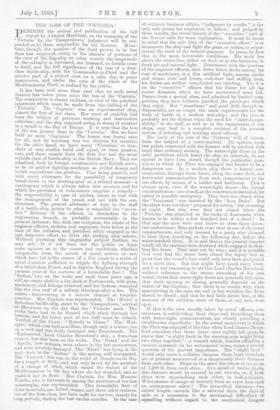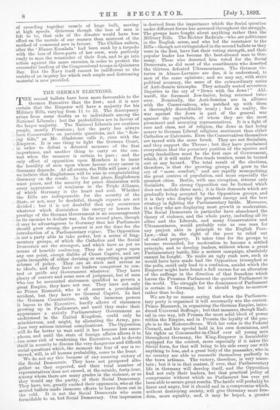THE LOSS OF THE VICTORIA.'
PENDING the arrival and publication of the full report by Admiral Markham, on the ramming of the ' Victoria ' by the Camperdown,' judgment will be sus- pended as to those responsible for the disaster. Mean- time, though the number of the dead proves to be less than was supposed, owing to the absence of portions of the crew of the flag-ship on other vessels, the magnitude of the calamity is increased, not lessened, as details come to hand, and. the full significance of the loss of a first- class battle-ship, with the Commander-in-Chief and the greater part of a picked crew, on a calm day, in peace manoeuvres, and under the eyes of the whole of the Mediterranean Fleet, is realised by the public.
It has been said more than once that no such naval disaster has taken place since the loss of the 'Captain.' The comparison is almost reckless, in view of the practical inferences which must be made from the sinking of the Victoria.' The 'Captain' was an experimental ship, almost the first of her class. Her want of stability had been the subject of previous warning and destructive criticism ; and the ship capsized owing to stress of weather in a squall in the Bay of Biscay. It is true that the loss of life was greater than in the Victoria.' But we have built no more Captains.' The lesson was learnt once for all, and its teaching was too obvious for mistake. On the other hand, we have many Victorias,' or iron- clads of very similar build and equal, or even greater, cost, and these vessels form the first line and the most reliable class of battle-ship in the British Navy. They are admitted, both by foreign constructors and British crews, to be as perfect fighting-machines as skilful design and lavish expenditure can produce. That being granted, and with every allowance for the possibility of temporary break-down in the steering-gear at a critical moment—a contingency which is always taken into account, and for which the provision of twin-screws supplies a remedy— the responsibility in case of mishap seems to rest with the management of the vessel, and not with the con- structors. The present allotment of duty to the staff of a battle-ship, points to what is miscalled the "execu- tive " division of the officers, in distinction to the engineering branch, as probably accountable in the present instance; for, with one exception, the whole of the engineer officers, stokers, and engineers were below at the time of the collision, and perished while engaged in the last desperate effort to drive the sinking ship ashore. Without pursuing this ungrateful subject further, we may ask,—Is it not time for the public to form some opinion as to the causes and conditions, whether inseparable from the nature of naval service or not, which have led in•the course of a few years to a series of naval disasters sufficient to cripple the fighting strength of a third-class Power, and to deprive England during the present year of the services of a formidable fleet ? The 'Sultan,' run on the rocks and sunk three years ago, is still an empty shell in a dry-dock at Portsmouth, with guns, machinery, and fittings removed, and her bottom crumpled like the iron roof of a railway terminus after a fire. The cause,—manceuvring in a narrow channel at torpedo- practice. Her Captain was reprimanded. The Howe,' a first-class battle-ship, sister to the Camperdown,' arrived at Sheerness on the day that the ' Victoria ' sank. The rocks have had to be blasted which stuck through her bottom, and the lower part of her hull must be rebuilt. Verdict of the Court : "Nobody to blame." The • War- spite, which cost half-a-million, though only a cruiser, ran on a rock and was badly damaged near Esquima,ult. The 'Undaunted,' Lord Charles Beresford's ship, a first-class cruiser, has also been on the rocks. The 'Naiad' and the Apollo,' new cruisers, went ashore in the last manceuvres, and were severely damaged. The 'Naiad' was lying in the next dock to the 'Sultan' in the spring, still unrepaired. The Victoria ' was run on the rocks at Dragliomesti Bay for a length of 80 ft., and was only saved by the accident of a change of wind, which raised the waters of the Mediterranean in the bay where she lay stranded, and so enabled her to float. Her Captain, the Hon. Maurice Bourke, who is fortunately among the survivors of her last catastrophe, was reprimanded. This formidable fleet of three ironclads, one belted cruiser, and three other cruisers, one of the first-class, has been unfit for service, mainly for long periods, during the last twelve months. In the case of ordinary business affairs, "judgment by results" is the only safe course for employers to follow ; and judged by these results, the recent record of the "executive" part of the Service calls for some explanation. It must be borne in mind that the sole duty of the "executive officer" is to manceuvre the ship and fight the guns, or rather, to super- intend the work of the trained gunners. In peace, he does this in the most favourable conditions. His work lies above the water-line, either on deck or in the batteries, in fresh air and. natural light. Contrasted with the position of the engineer officers, shut down below decks among the roar of machinery, in a dim artificial light, among smoke and steam, rods and levers, coal-dust and stifling heat, his duties are neither complicated nor exacting. Yet it is on the " executive " officers that the blame for all the recent disasters which we have enumerated must fall.
Drawn from a special class, and admitted by limited com- petition, they have hitherto justified the privileges which they enjoy. But "smartness" and good drill, though in- dispensable, are no longer the main requirements for the work of battle in a modern war-ship ; and the time is probably not far distant when the need for "interchange- ability," in the staff, as well as in the equipments of our ships, may lead to a complete revision of the present system of selecting and training naval officers. The facts of the loss of the 'Victoria' will, of course, form the subject of a court-martial. Its opinion upon two points connected with the disaster will be awaited with more than ordinary anxiety. The water-tight doors in the solid partitions which bisect the ship at intervals, do not appear to have been closed, though the particular !pan- ceuvre in which the Fleet was engaged was known to be a dangerous one. In a modern ship there is lateral com- munication, through these doors, along the same deck, an4 horizontal communication from each compartment to the one above, by means of a ladder and hatchway. This is always open, even if the water-tight doors—the lateral communication—are closed, as the constructors intended, for safety in possible emergency. They were not closed when the 'Vanguard' was rammed by the 'Iron Duke.' But the ships were not then "prepared for action," but steaming at night. But why were they not closed when the 'Victoria' was stranded on the rocks of Acarnania, wheu known to be within a few hundred feet of a shoal ? Ia that case the crew were sent below to close these doors; two unfortunate Blue-jackets were shut in one of the lower compartments, and only rescued by a party who chanced to hear them knocking, on the following day, before the water reached them. It is said that in the present disaster nearly all the marines were drowned while engaged in shut- ting the doors. That may not be true ; and it is possible that even had the doors been closed the injury was so great that the vessel's loss could only have been postponed for a short time. But that might have saved many lives; and it is not reassuring to see that Lord Charles Beresferd, without reference to the recent stranding of his own vessel, states that water-tight doors are generally left open, that their opening or closing generally depends on the orders of the Captain ; that there is no reason why, when manceuvring in the open sea and in fine weather, the doors should be closed ; and that he had little doubt that, at the moment of the collision, most of them, at any rate, we open. If this is the view usually taken by naval officers, con- structors, in subdividing their ships and furnishing them with water-tight communication, are clearly providing a troublesome superfluity. In the actual manceuvre in which the Fleet was engaged at the time when Lord Charles Beres- ford considers that these doors were rightly left open, he states that "a slight fault in the steering-gear might bring two ships together,"—a remark which, besides affording a curious comment on his subsequent views, raises a second question of the gravest importance. The "slight fault" would only cause a collision because these huge ironelads are at present maneeuvred at a dangerously short distance from each other. Ships in the same line steam at intervals of 1,200 ft. from each other. At a speed of twelve knots, this distance would be covered in one minute, or, if both ships were approaching each other, in half-a-minute What chance of escape or recovery from an error does suck an arrangement allow ? The prescribed distance—two cables' length—sounds like a survival from the days of sails or a concession to the mechanical difficulties of signalling without regard to the mechanical_ dangere of crowding together vessels of huge bulk, moving at high speeds. Grievous though the loss of men is felt to be, that side of the disaster would have less effect on the morale of our seamen than mistrust of the method of command now in favour. The Chilian sailors, after the Blanco Encalada ' had been sunk by a torpedo with the loss of three-parts of her crew, were perfectly ready to man the remainder of their fleet, and to go into action against the same enemies, in order to protect the successful landing of the Congressional troops in Quinteros Bay. But the Navy itself cannot be indifferent to the results of an inquiry for which such ample and distressing material is now provided.











































 Previous page
Previous page